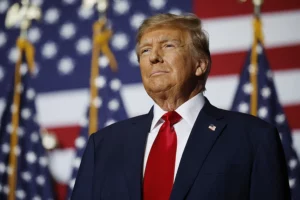In a concentrated effort to protect American economic interests, President Donald Trump signed two significant memorandums on Friday night aimed at safeguarding U.S. technology companies and limiting foreign influence. The first memorandum addresses what the administration deems unfair digital service taxes imposed by foreign nations, notably targeting countries like France and the UK. This directive allows for the imposition of tariffs on countries that tax American tech companies such as Apple and Google, as part of a strategy to defend U.S. industries from perceived exploitation.
Trump Implements Tariffs and Investment Restrictions to Shield U.S. Business Interests

Trump Implements Tariffs and Investment Restrictions to Shield U.S. Business Interests
President Trump's latest moves target foreign digital taxes and Chinese investments in critical U.S. sectors, emphasizing economic protectionism.
The second memorandum seeks to restrict Chinese investments in crucial sectors including technology and agriculture, reinforcing the administration's stance on national security. Although not explicitly mentioning China, it establishes frameworks to prevent foreign entities from compromising essential American industries. The Committee on Foreign Investment in the United States (CFIUS) is set to develop new regulations to regulate these investments, indicating a broader intention to limit U.S. economic dependence on Beijing.
These measures align with Trump's long-held "America First" policy, aligning protectionist economic strategies with national security imperatives. By placing tariffs on nations perceived to exploit American businesses through unfair taxation, and by limiting Chinese investments, Trump's administration aims to fortify the U.S. economy against foreign influence.
Trump's actions come amidst rising concerns over digital service taxes collected by countries targeting U.S. tech giants, which many see as unjust. By implementing tariffs in response to these taxes, the administration hopes to level the playing field for American companies and create a more equitable international trade environment. Simultaneously, by strategically curbing Chinese investment, the administration addresses bipartisan worries about China's increasing footprint in vital U.S. industries.
As these directives unfold, President Trump is reiterating his administration's commitment to ensure American businesses are safeguarded from international economic challenges. These actions send a clear message that the United States intends to maintain its economic integrity and independence against any attempts to undermine its industries and innovation.
These measures align with Trump's long-held "America First" policy, aligning protectionist economic strategies with national security imperatives. By placing tariffs on nations perceived to exploit American businesses through unfair taxation, and by limiting Chinese investments, Trump's administration aims to fortify the U.S. economy against foreign influence.
Trump's actions come amidst rising concerns over digital service taxes collected by countries targeting U.S. tech giants, which many see as unjust. By implementing tariffs in response to these taxes, the administration hopes to level the playing field for American companies and create a more equitable international trade environment. Simultaneously, by strategically curbing Chinese investment, the administration addresses bipartisan worries about China's increasing footprint in vital U.S. industries.
As these directives unfold, President Trump is reiterating his administration's commitment to ensure American businesses are safeguarded from international economic challenges. These actions send a clear message that the United States intends to maintain its economic integrity and independence against any attempts to undermine its industries and innovation.





















